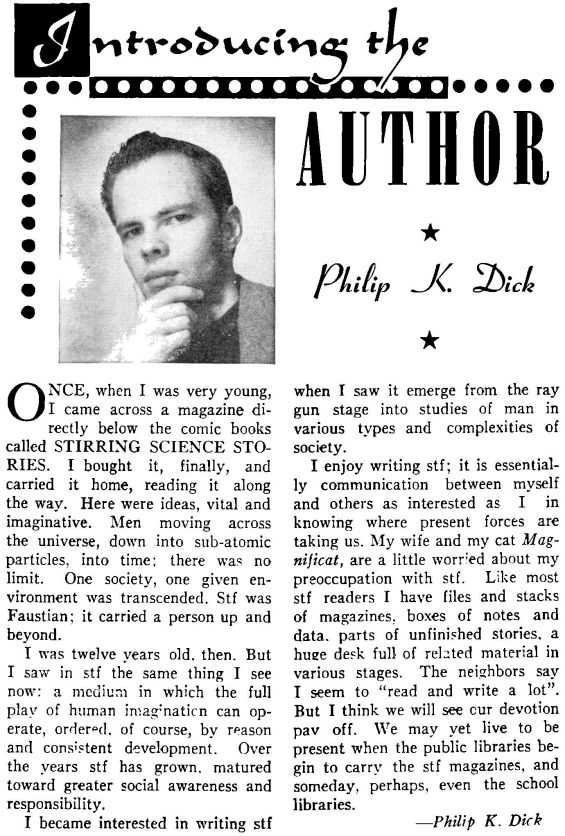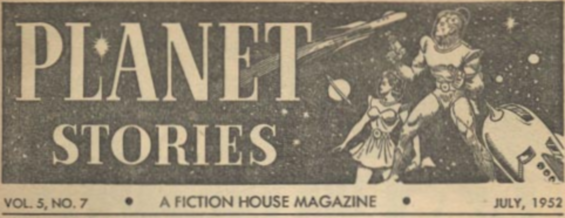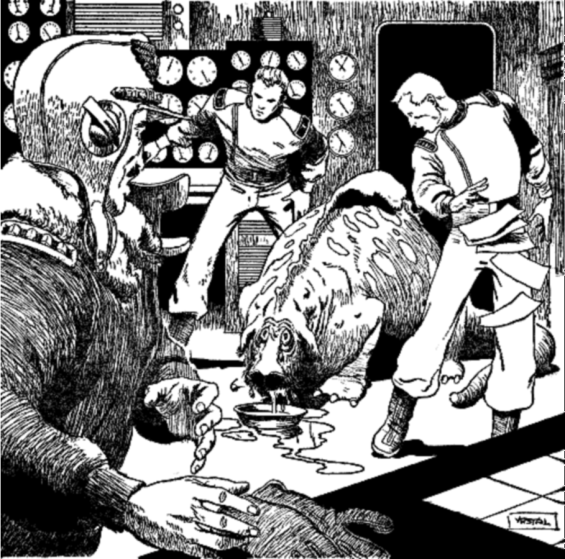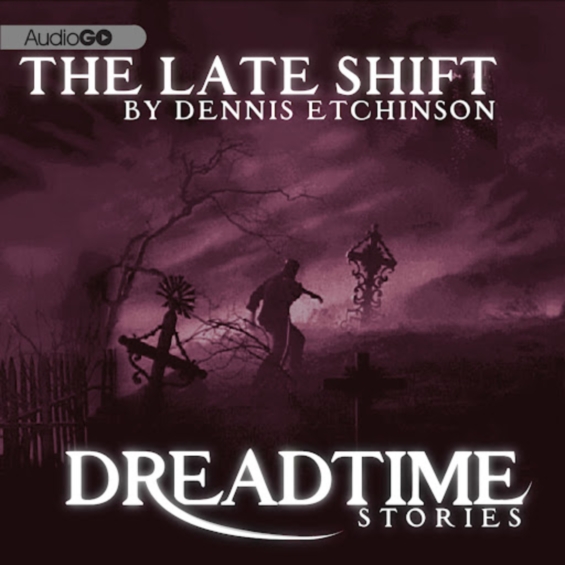
First podcast February 9, 2009.
HERE are the original shownotes.
Posted by Jesse Willis

In my researches of the public domain short stories, novelettes, and novellas of Philip K. Dick I’ve just discovered this wonderful, sad, and surprising self-portrait by Philip K. Dick. It appeared as the inside front cover of Imagination’s February 1953 issue (which would have been when Dick was about 24 years old).
In it he talks about his early origins as an Science Fiction reader, paints a picture of himself as a misunderstood fan of scientificition (which he abbreviates as “stf”), and as a person who dreams of one day seeing SF magazines in public libraries (and school libraries). To me that’s the really sad part. Heinlein can dream of seeing a man on the moon and see that achieved in his own lifetime. But I’ve yet to see a public library, let alone a school library, with a regular subscription to any SF magazine.
On the bright side of things we learn that his cat, at the time, was named “Magnificat” – and that’s pretty damned awesome.
Here’s the scan:

And here is the complete text:
Once, when I was very young, I came across a magazine directly below the comic books called STIRRING SCIENCE STORIES. I bought it, finally, and carried it home, reading it along the way. Here were ideas, vital and imaginative. Men moving across the universe, down into sub-atomic particles, into time: there was no limit. One society, one given environment was transcended. Stf was Faustian; it carried a person up and beyond.
I was twelve years old, then. But I saw in stf the same thing I see now: a medium in which the full play of human imagination can operate, ordered, of course, by reason and consistent development. Over the years stf has grown, matured toward greater social awareness and responsibility.
I became interested in writing stf when I saw it emerge from the ray gun stage into studies of man in various types and complexities of society.
I enjoy writing stf; it is essentially communication between myself and others as interested as I in knowing where present forces are taking us. My wife and my cat Magnificat, are a little worried about my preoccupation with stf. Like most stf readers I have files and stacks of magazines, boxes of notes and data. parts of unfinished stories, a huge desk full of related material in various stages. The neighbors say I seem to “read and write a lot”. But I think we will see our devotion pay off. We may yet live to be present when the public libraries begin to carry the stf magazines, and someday, perhaps, even the school libraries.
-Philip K. Dick
Posted by Jesse Willis

There’s probably always going to be a place in my heart for Philip K. Dick’s Beyond Lies The Wub. It was my first PKD short story. It’s very short and usually runs just over fifteen minutes read aloud – which I frequently do. And even though Dick claimed only to have been paid $15 for it*, I find it absolutely invaluable.
I’ve felt that way from the very first time I heard it, back in 2006. The narrator, Mac Kelly, delivered the story at a measured pace that really sang the story to me.
Since then I’ve become even more enamored with Gregg Margarite’s rendition, recorded for LibriVox in 2009.
And that’s the one I’d like to share with you. I share it with you now, but you can share it with your friends too because, not only is the story public domain, the audiobook itself is too!
 Beyond Lies The Wub
Beyond Lies The Wub
By Philip K. Dick; Read by Gregg Margarite
1 |MP3| – Approx. 16 Minutes [UNABRIDGED]
Publisher: LibriVox.org
Published: May 4, 2009
|ETEXT|
The slovenly wub might well have said: Many men talk like philosophers and live like fools. First published in Planet Stories, July 1952.



And here’s a combination of the narration with the magazine scans:
Posted by Jesse Willis
*As reported in Dick’s introduction to the story in First Voyages, a 1981 anthology of the first published short stories by famous SF authors.

 Powerful podcasting, that’s what Dan Carlin’s Hardcore History was. Carlin used to put out the most powerful podcasts I’d ever heard. With episodes like Punic Nightmares, Ghosts Of The Ostfront, and Steppe Stories (now available as audiobook downloads). Half-way through them I’d be calling up friends and telling them “Hey, new Dan Carlin is out!” and then start telling them how awesome the show was.
Powerful podcasting, that’s what Dan Carlin’s Hardcore History was. Carlin used to put out the most powerful podcasts I’d ever heard. With episodes like Punic Nightmares, Ghosts Of The Ostfront, and Steppe Stories (now available as audiobook downloads). Half-way through them I’d be calling up friends and telling them “Hey, new Dan Carlin is out!” and then start telling them how awesome the show was.
And over the years I can’t say the show ever went bad – because it really never did – it just didn’t consistently hit the incredibly high highs that it had earlier. That is until just before this point this morning…

…where I realized that there was a new classic Dan Carlin out.
Carlin’s connective thread in this episode – that the insane choices of 20th century history are in fact a kind of horrific logic – delivered with fascinating historical evidence and illustrated with his incredible storytelling skill, shows the inevitable, frightening, awful logic of bombing cities full of people – even with nuclear weapons.
Carlin poses questions like. ‘In war, how many enemy civilians are you willing to kill in order to save one of your own people’s lives?’
And of course if that number is not equal to zero you’re down the path towards logical insanity.
Here’s the episode |MP3|
Podcast feed:
http://feeds.feedburner.com/dancarlin/history?format=xml
Posted by Jesse Willis

 A friend of mine has been considering buying The Righteous Mind: Why Good People Are Divided By Politics And Religion (a new book by Jonathan Haidt). I told him it didn’t appear to exist as an audiobook – at least not yet.
A friend of mine has been considering buying The Righteous Mind: Why Good People Are Divided By Politics And Religion (a new book by Jonathan Haidt). I told him it didn’t appear to exist as an audiobook – at least not yet.
He had said he wanted to read it because he thought it might offer a hope of explaining the behavior of the strange people around him, and how he might better understand it and them.
I guess he wasn’t satisfied with my own hypothesis:
“perhaps hypocrisy can only be seen by people with two brain cells to rub together”
And while there still doesn’t appear to be an audiobook available my friend wrote to me last night saying:
“no need to buy the book, this is better…
http://bloggingheads.tv/videos/9376”
I’ll now admit, after hearing the author speak his book’s thesis, it does sound fairly interesting!
|MP3|
Here’s the official description of the book itself:
“Why can’t our political leaders work together as threats loom and problems mount? Why do people so readily assume the worst about the motives of their fellow citizens? In The Righteous Mind, social psychologist Jonathan Haidt explores the origins of our divisions and points the way forward to mutual understanding.
His starting point is moral intuition—the nearly instantaneous perceptions we all have about other people and the things they do. These intuitions feel like self-evident truths, making us righteously certain that those who see things differently are wrong. Haidt shows us how these intuitions differ across cultures, including the cultures of the political left and right. He blends his own research findings with those of anthropologists, historians, and other psychologists to draw a map of the moral domain, and he explains why conservatives can navigate that map more skillfully than can liberals. He then examines the origins of morality, overturning the view that evolution made us fundamentally selfish creatures. But rather than arguing that we are innately altruistic, he makes a more subtle claim—that we are fundamentally groupish. It is our groupishness, he explains, that leads to our greatest joys, our religious divisions, and our political affiliations. In a stunning final chapter on ideology and civility, Haidt shows what each side is right about, and why we need the insights of liberals, conservatives, and libertarians to flourish as a nation.”
Posted by Jesse Willis


 AudioGo has started releasing a new series of HORROR SHORTS that they’re calling DREADTIME STORIES. And they’ve given us the first one to give to you TOTALLY FREE!
AudioGo has started releasing a new series of HORROR SHORTS that they’re calling DREADTIME STORIES. And they’ve given us the first one to give to you TOTALLY FREE!
This FREE GIVEAWAY will expire on April 15th, 2012, so do download it straight away!
You can get the rest of the series at the AudioGo website where they offer hassle-free MP3 downloads for just $1.49 each! Other tales in the series were penned by authors like Steve Nubie, M.J. Elliott, and Max Allan Collins!
Dreadtime Stories #01 – The Late Shift
By Dennis Etchinson; Performed by a full cast
1 MP3 – Approx. 39 Minutes [UNABRIDGED]
Publisher: AudioGo
Published: 2012
“Ever wonder what the dead might have to say when they are alone with each other? It turns out that the dead are neither comical nor menacing. They are just tired and lost and in search of peace. They are people like you and me who want to rest now that their work is done. The problem is, the system wants to continue to exploit them even beyond death. It’s a grim proposition but the logical extension of our society when a sinister company reanimates corpses in order to provide free labor for the late night shifts in stores and garages. Hosted by Malcolm McDowell and commissioned by Fangoria–America’s #1 source for horror–this original short story is fully dramatized to thrill and chill you!”
Posted by Jesse Willis